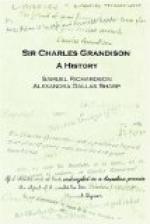A truly worthy divine, at the appointment of the bishop of the diocese, to direct and animate the devotion of such a society, and to guard it from that superstition and enthusiasm which soars to wild heights in almost all nunneries, would confirm it a blessing to the kingdom.
I have another scheme, my lord, proceeded Sir Charles—An hospital for female penitents; for such unhappy women, as having been once drawn in, and betrayed by the perfidy of men, find themselves, by the cruelty of the world, and principally by that of their own sex, unable to recover the path of virtue, when perhaps, (convinced of the wickedness of the men in whose honour they confided,) they would willingly make their first departure from it the last.
These, continued he, are the poor creatures who are eminently entitled to our pity, though they seldom meet with it. Good nature, and credulity, the child of good nature; are generally, as I have the charity to believe, rather than viciousness, the foundation of their crime. Those men who pretend they would not be the first destroyers of a woman’s innocence, look upon these as fair prize. But, what a wretch is he, who seeing a poor creature exposed on the summit of a dangerous precipice, and unable, without an assisting hand, to find her way down, would rather push her into the gulf below, than convey her down in safety?
Speaking of the force put upon a daughter’s inclinations in wedlock; Tyranny and ingratitude, said Sir Charles, from a man beloved, will be more supportable to a woman of strong passions, than even kindness from a man she loves not: Shall not parents then, who hope to see their children happy, avoid compelling them to give their hands to a man who has no share in their hearts?
But would you allow young ladies to be their own choosers, Sir Charles? said Mr. Reeves.
Daughters, replied he, who are earnest to choose for themselves, should be doubly careful that prudence justifies their choice. Every widow who marries imprudently, (and very many there are who do,) furnishes a strong argument in favour of a parent’s authority over a maiden daughter. A designing man looks out for a woman who has an independent fortune, and has no questions to ask. He seems assured of finding indiscretion and rashness in such a one, to befriend him. But ought not she to think herself affronted, and resolve to disappoint him?
But how, said Lady G——, shall a young creature be able to judge—
By his application to her, rather than to her natural friends and relations; by his endeavouring to alienate her affections from them; by wishing her to favour private and clandestine meetings (conscious that his pretensions will not stand discussion); by the inequality of his fortune to hers: and has not our excellent Miss Byron, in the letters to her Lucy, (bowing to me,) which she has had the goodness to allow us to read, helped us to a criterion? ‘Men in their addresses to young women,’ she very happily observes, ’forget not to set forward the advantages by which they are distinguished, whether hereditary or acquired; while love, love, is all the cry of him who has no other to boast of.’




